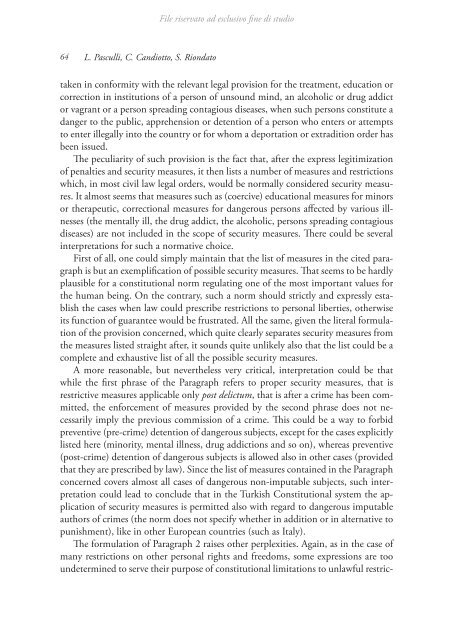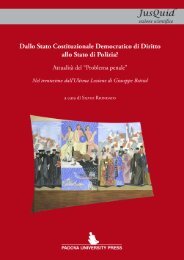il libro - Silvio Riondato
il libro - Silvio Riondato
il libro - Silvio Riondato
Create successful ePaper yourself
Turn your PDF publications into a flip-book with our unique Google optimized e-Paper software.
64 L. Pasculli, C. Candiotto, S. <strong>Riondato</strong><br />
F<strong>il</strong>e riservato ad esclusivo ne di studio<br />
taken in conformity with the relevant legal provision for the treatment, education or<br />
correction in institutions of a person of unsound mind, an alcoholic or drug addict<br />
or vagrant or a person spreading contagious diseases, when such persons constitute a<br />
danger to the public, apprehension or detention of a person who enters or attempts<br />
to enter <strong>il</strong>legally into the country or for whom a deportation or extradition order has<br />
been issued.<br />
e peculiarity of such provision is the fact that, after the express legitimization<br />
of penalties and security measures, it then lists a number of measures and restrictions<br />
which, in most civ<strong>il</strong> law legal orders, would be normally considered security measures.<br />
It almost seems that measures such as (coercive) educational measures for minors<br />
or therapeutic, correctional measures for dangerous persons aected by various <strong>il</strong>lnesses<br />
(the mentally <strong>il</strong>l, the drug addict, the alcoholic, persons spreading contagious<br />
diseases) are not included in the scope of security measures. ere could be several<br />
interpretations for such a normative choice.<br />
First of all, one could simply maintain that the list of measures in the cited paragraph<br />
is but an exemplication of possible security measures. at seems to be hardly<br />
plausible for a constitutional norm regulating one of the most important values for<br />
the human being. On the contrary, such a norm should strictly and expressly establish<br />
the cases when law could prescribe restrictions to personal liberties, otherwise<br />
its function of guarantee would be frustrated. All the same, given the literal formulation<br />
of the provision concerned, which quite clearly separates security measures from<br />
the measures listed straight after, it sounds quite unlikely also that the list could be a<br />
complete and exhaustive list of all the possible security measures.<br />
A more reasonable, but nevertheless very critical, interpretation could be that<br />
wh<strong>il</strong>e the rst phrase of the Paragraph refers to proper security measures, that is<br />
restrictive measures applicable only post delictum, that is after a crime has been committed,<br />
the enforcement of measures provided by the second phrase does not necessar<strong>il</strong>y<br />
imply the previous commission of a crime. is could be a way to forbid<br />
preventive (pre-crime) detention of dangerous subjects, except for the cases explicitly<br />
listed here (minority, mental <strong>il</strong>lness, drug addictions and so on), whereas preventive<br />
(post-crime) detention of dangerous subjects is allowed also in other cases (provided<br />
that they are prescribed by law). Since the list of measures contained in the Paragraph<br />
concerned covers almost all cases of dangerous non-imputable subjects, such interpretation<br />
could lead to conclude that in the Turkish Constitutional system the application<br />
of security measures is permitted also with regard to dangerous imputable<br />
authors of crimes (the norm does not specify whether in addition or in alternative to<br />
punishment), like in other European countries (such as Italy).<br />
e formulation of Paragraph 2 raises other perplexities. Again, as in the case of<br />
many restrictions on other personal rights and freedoms, some expressions are too<br />
undetermined to serve their purpose of constitutional limitations to unlawful restric-



